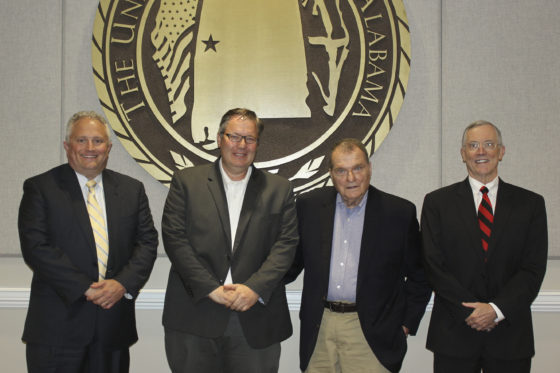UWA receives $3M land gift for Biodiversity Center
LIVINGSTON, Ala.— Bibb County resident William D. “Bill” Hubbard recently donated more than 2,000 acres of land valued at more than $3 million for the development of a conservation and research program at the University of West Alabama.
UWA recognized Hubbard at a luncheon with members of his family and friends on campus, offering a glimpse into the vision that Hubbard has shared with UWA for the property. At the luncheon, Hubbard announced his pledge to match up to $200k of funds raised over the next 24 months for projects related to the property and its research and education initiatives.

From left are Dr. Chris Thomason, vice president for institutional advancement; Dr. Brian Keener, professor of biological sciences; Bill Hubbard, and Dr. Ken Tucker, university president.
Located in Centreville, the property boasts some of the most pristine natural resources that researchers say they have experienced.
The property and the program to be developed will be known as the Cahaba Biodiversity Center. Hubbard began acquiring individual tracts of land in 2002, growing it to more than 2,000 acres through seven acquisitions. Initially, he intended to build his retirement home in the woods of Bibb County.
He did build a home there, and a barn, and more, but Hubbard said that he soon realized the property had more far-reaching opportunities that could benefit generations of students to come. He began considering schools that could use the land and its resources in a way that would conserve it for posterity and serve as a teaching tool.
“I know that UWA will provide millions of teachable moments here,” Hubbard said. “Land utilization and biological conservation need not be exclusive of each other. I am confident that UWA will fulfill my dream and vision for the property.”
“This is a visionary gift that will benefit countless generations to come,” said Dr. Chris Thomason, vice president for institutional advancement at UWA.
“We are excited to receive this potentially transformative donation, and are very grateful to Mr. Hubbard for his vision and generosity,” said UWA President Ken Tucker.
“The primary purpose and use of the property will be for education and conservation. The opportunities for hands-on experience in biology, conservation, and environmental sciences on the Hubbard property will be invaluable in the continuing development of our undergraduate degrees in Conservation and Field Biology and Environmental Sciences, and our new Master of Science in Conservation Biology.”
The water-side property overlooks the resource-rich Cahaba River, and in its banks are countless native species of flora and fauna. Its center is seven miles downstream from the Cahaba River National Wildlife Refuge.
Hubbard has built a friendship with Dr. Brian Keener, professor of biological sciences and assistant dean of graduate studies at UWA. Keener is also coordinator of the Alabama Plant Atlas and curator of the UWA Herbarium. Hubbard’s friendship and trust in Keener, he said, made the difference in his decision to donate the natural treasure to UWA.
“Mr. Hubbard’s gift and his vision for this property will make a tremendous impact on our students and their education,” Keener said. “The biodiversity here is unrivaled in the country. Exposed limestone, the geology, hydrology, caves, rocks, plants—it’s not some of the young cretaceous stuff. When we study biodiversity, the older it is, the better, and this is old and virtually untouched.”
In describing its botanical and zoological assets, Keener said the property boasts, for example, three new populations of endangered Georgia Rock Cress.
“With the research and learning opportunities available at this site, we can draw students from all over the country,” Keener said. “The tract is unrivaled in Alabama and, quite honestly, is and will be envied by many. The possibilities are simply unquantifiable. The upside is off the charts.”
Research activities for UWA faculty and students will focus primarily on botanical and zoological biodiversity, ecology, archaeology, water quality, and conservation land management. The property also may be used in other new curricula such as outdoor enterprises and forestry technology.
UWA will manage the facility for researchers at other institutions who participate in similar research endeavors. Likewise, UWA will coordinate with regional K-12 schools for field trips and visits to offer exposure to research and resources for young students.
To learn more about plans for UWA’s Cahaba Biodiversity Center, contact Dr. Brian Keener at bkeener@uwa.edu or call 205-652-3796.
